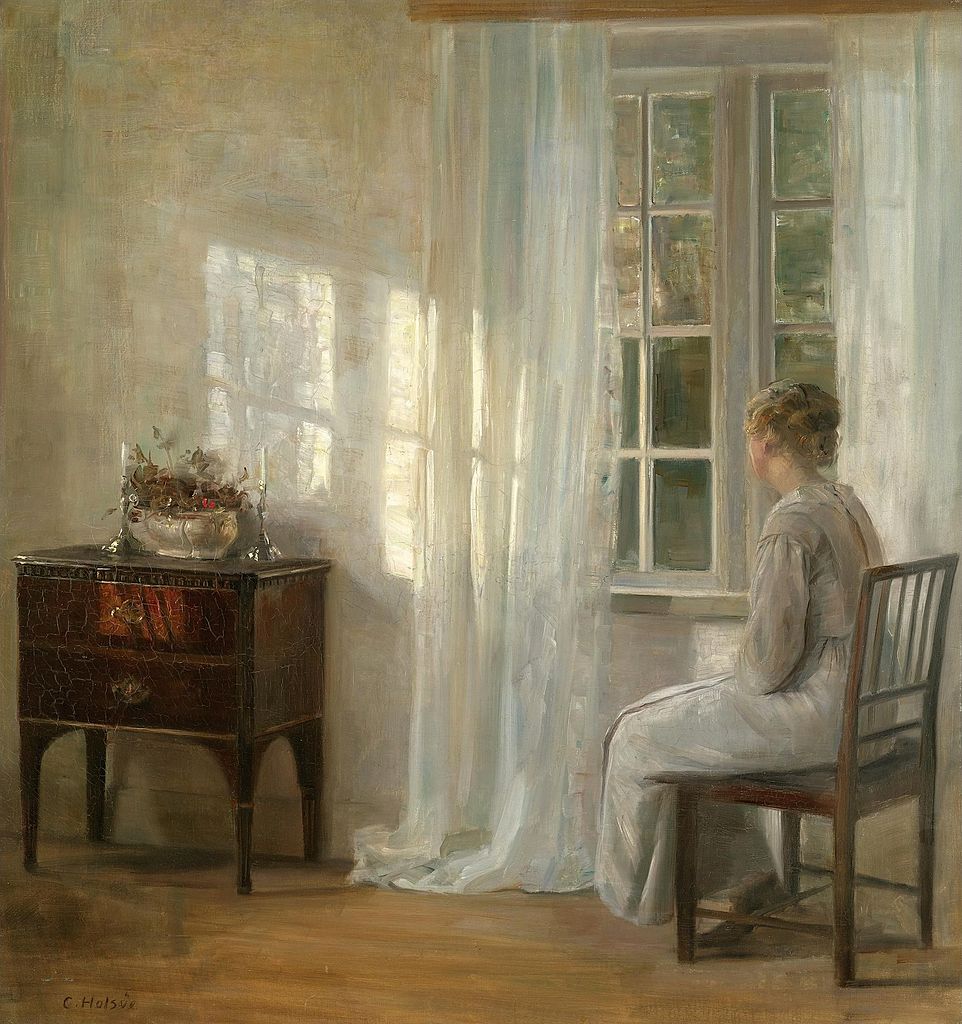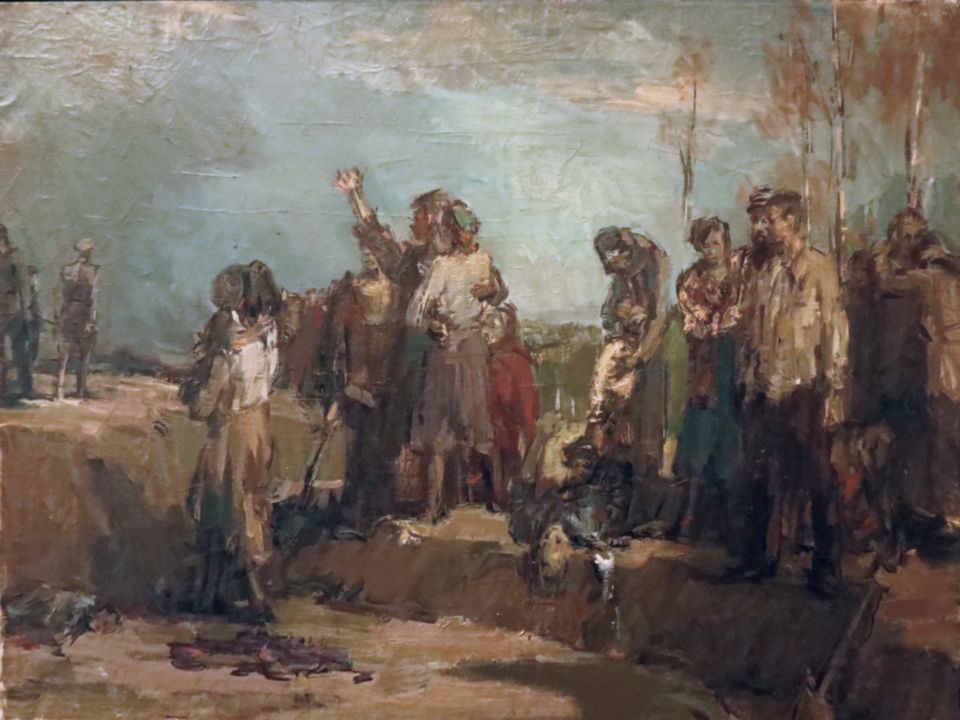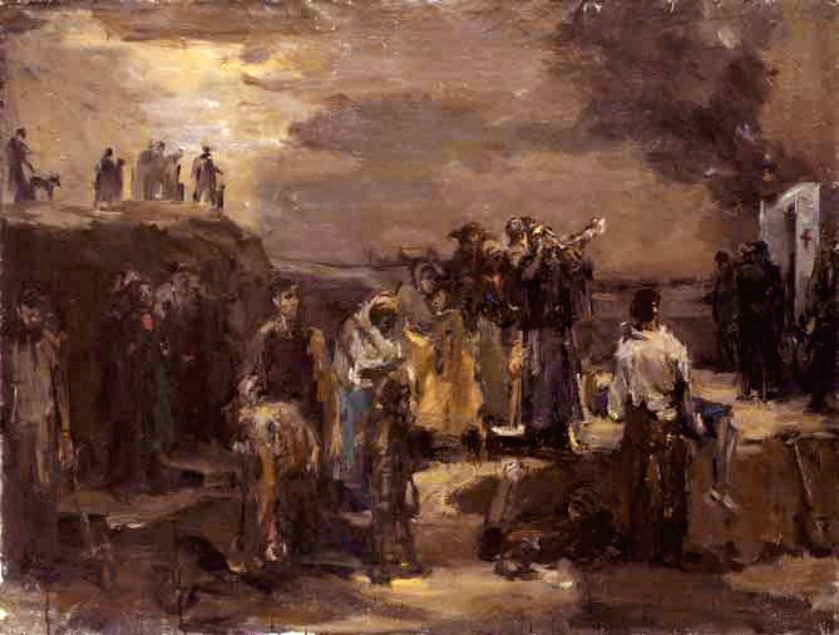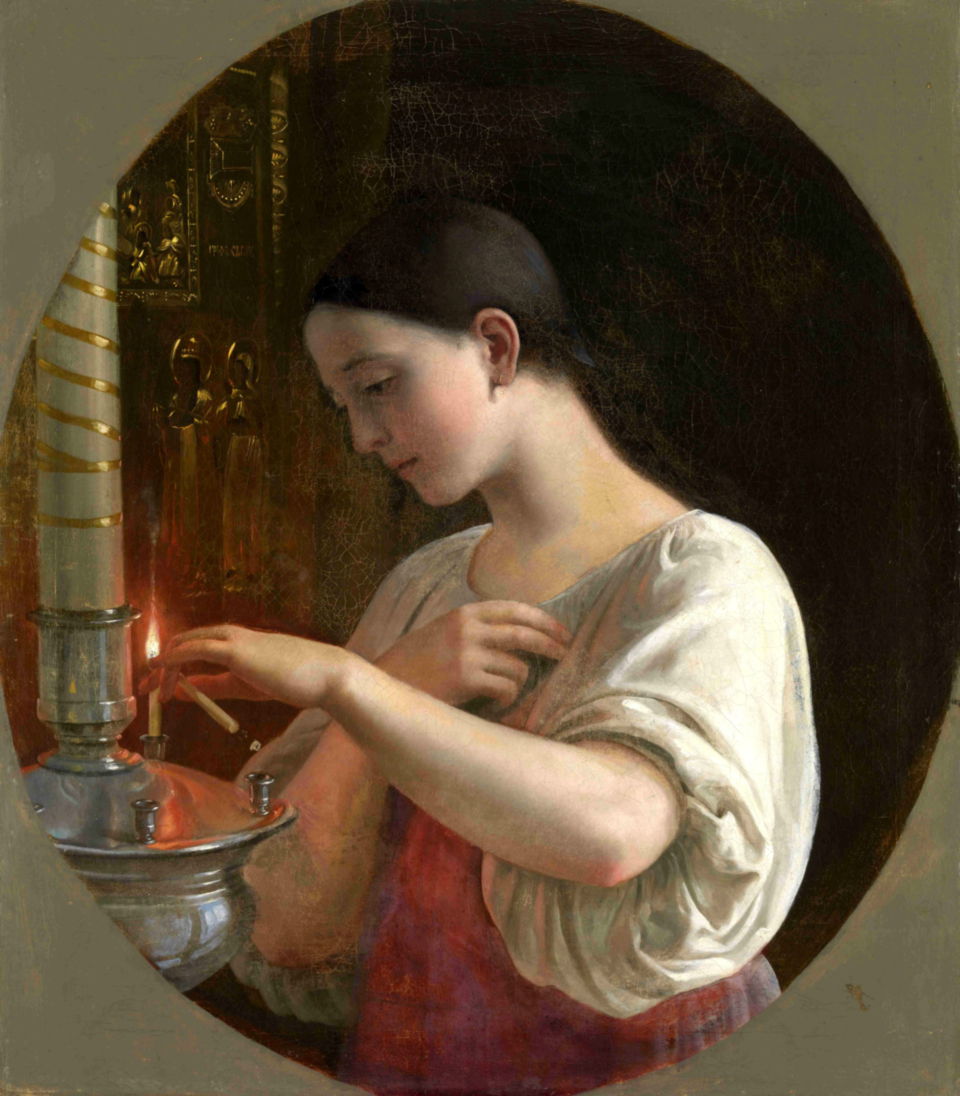I triumphed over death ahead of time,
And time itself through love I overcame,
I shall not name You, my Eternal Friend,
But You’ll still heed these reverent strains …
I had no faith in the illusive world,
Yet underneath matter’s coarse shell,
I sensed Your flawless mantle’s glow,
Discerning the Divine that therein dwells.
Hadn’t You thrice revealed Yourself to me?
Not as mind’s fancy, which is best ignored.
My soul cried out, your countenance appeared —
A portent — or an aid — or a reward.
I.
The first time—O, how long ago it was!
Thirty-six years have come and gone since then,
When my child’s soul came all at once to know
Love’s melancholy dreams and anxious pangs.
I was but nine and she…* was nine as well.
“It was a fine May day in Moscow” to quote Fet.**
I had professed my love. Dead silence. Oh, my God!
She loves another! Ah! He’ll pay for that!
I’ll duel him right now!!! Church. Ascension Mass.”***
Torrents of passion seethe within my soul.
Let us together… cast off… our earthly cares…
The notes expand, grow hushed, then silence falls.
The altar’s open… But where’s priest and deacon?
Where is the crowd of worshippers at prayer?
The streams of passion suddenly run dry.
Sky-blue descends, my soul fills with azure.
Suffused with golden azure, there You stood,
Holding a bloom from climes unknown.
You nodded at me, smiled a radiant smile,
Entered the gathering mist and were gone.
My childish love now seemed an alien thing,
My soul became forever blind to earthly joys.
Our German nanny kept repeating sadly,
“Ach, little Volodya! Too much a foolish boy!”
*Author’s note: “She” in the stanza was just an ordinary young lady, and has nothing in common with the “you” to whom the preamble is addressed.
**Afanasy Afanasyevich Fet (1820-1892) was a master of the Russian lyric confessional poem and a close friend of Solovyov from his Moscow university days.
***Church feast that commemorated Jesus’s ascension to Heaven. According to Russian folk beliefs, the feast concludes a 40 day period when boundaries are dissolved between worlds of the living, the dead, the divine, the mortal, the sinners, and the righteous.
II.
Years passed. I’ve got my Master’s, I’m a docent.
First time abroad—I’m off on a mad flight!
Berlin, Hannover, and Cologne emerge,
Flash by, and disappear from sight.
I dreamt of neither Paris—world’s great centre,
Nor Spain, nor yet the gaudy glittering East.
My one dream was of the British Museum—
And it didn’t disappoint me in the least.
Could ever I forget that blessed half a year?
I paid no heed to fleeting beauty—here and gone,
To people’s daily lives, passions, or nature,
My soul, the whole of it, was ruled by You alone.
Let human masses scramble about their business,
Amidst the roar of fire-breathing trains,*
Let them erect their giant soulless buildings,
I’m here alone, where sacred silence reigns.
Well, naturally, take that cum grano salis,**
Alone does not mean that I hated man.
Despite my solitude, I still met with some people.
Let’s see: which of them should I mention then?
A pity that their names won’t fit my meter,
Names, that, one might say, were not unknown;
There were a couple British wonder-workers,
Two or three Moscow docents, far from home.
Still, I was frequently alone when reading,
And (you can think whatever you like) God knows,
That some mysterious powers led me
To everything about Her ever put to prose.
And when, if spurred on by some sinful fancy,
Toward “another genre” of book I’d roam,
Such incidents ensued, that I would often
Have to pick up and, mortified, go home.
Then, once (it happened sometime in the fall),
I told Her, “Oh, Divinity at its height,
I know You’re here, but since that time in childhood
Why hadn’t You revealed Yourself to sight?”
And just as I had thought these words unspoken,
Golden azure enveloped me again,
And right in front of me, I saw Her glimmer,
But just Her face—that’s all I saw back then.
That moment turned into long-lasting joy,
My soul once more grew blind to mundane things,
And if I talked to “sober, serious types,”
My words seemed muddled dumb imaginings.
*Literally, the Russian phrase can be translated as “fire-breathing machines” but in the 19th-century, “fire-breathing machines” was a byword used to describe trains.
**“With a grain of salt” (Latin).
III.
I told Her then, “You had revealed Your face,
But how I yearn to see the whole of You…
What You did not begrudge a child,
Denying a young man just wouldn’t do!”
“Go forth to Egypt,” a voice within resounded.
I must reach Paris then! –The railway rushed me south.
Reason and feeling never had to argue,
Reason turned idiot and shut its mouth.
From Lyons to Turin, Piacenza, then Ancona,
From Fero to Bari, and then to Brindisi,
And finally a British steamer raced me
Across the quivering blue bosom of the sea.
In Cairo, I found both shelter and credit
At the Abbot Hotel, alas, gone long ago…
A cozy, modest place, the best hotel around!
Russians lodged there—even from Moscow.
The General in room nine cheered all the lodgers
With stories of the Caucasus of yore…
It’d do no harm to name him—he’s long dead,
And I’ll recall just good things, nothing more.
It was the famous Rostislav Fadeev,
Retired war hawk, handy with the pen,
He’d name a strumpet or a church council
with equal ease—a most resourceful man.
Twice daily we‘d meet over the table d’hôte,
He talked a lot and all in cheerful vein—
He’d always have off-coloured jokes at hand
And from philosophizing he would not abstain.
But I awaited my cherished rendezvous.
Then, one still night, it happened: I could hear
A passing cool breeze whisper to me:
“I’m in the desert, come to meet me there.”
I’d have to walk (neither in London nor Sahara
Does anyone transport young men for free—
Meanwhile, my pockets were completely barren;
Credit alone had been sustaining me).
So one fine day, without funds or provisions,
I set off, like Nekrasov’s Uncle Vlas,*
(Say what you will, but I’ve secured my rhyme now)
Where I was going, I was at a loss.
You must have laughed to see me in the desert:
I donned a tall top hat and overcoat—
I frightened a huge Bedouin nearly witless,
I was the devil himself, he must have thought.
He would’ve killed me too, but there was a council—
Two sheikhs of different tribes argued what to do
In noisy Arabic, then bound my hands together
As if I were a slave, and without much ado
Took me as far from them as possible,
Graciously untied my hands and walked away.
I’m laughing with You now—both gods and humans
Can laugh at troubles once they’ve had their day.
Meanwhile, a silent night descended;
It came right down: no beating round the bush—
I watched the darkness midst the flickering stars
And heard nothing around me but the hush.
I lay down on the ground, as I looked on and listened,
When lo: a jackal howled, atrociously enough.
He must have longed to eat me for his dinner,
And I didn’t even have a stick to beat him off!
But never mind the jackal! It was freezing…
It fell to zero, but was hot all through the day.
The stars were shining mercilessly bright;
Both light and cold were keeping sleep at bay.
And long I lay there in that awful stupor,
When suddenly it came: “Sleep, my poor friend!”
I fell asleep and when I roused awake,
The scent of roses filled both skies and land.
Aglow in a celestial royal purple,
Eyes blazing with an azure flame,**
You looked on, like the early dawning
Of a universal new creation day.
What is, what was, what’s coming through the ages,
Was all embraced by that unmoving gaze…
Below me I could see the blue of seas and rivers,
The distant forests, snowy mountain chains.
I saw the whole of it, and all of it was one—
A single image of feminine beauty,
The measureless encompassed in its measure,
No one but You, before me and within me.
Oh, radiant-eyed! I hadn’t been deceived:
Back in the desert I was shown You whole…
And in my soul those roses will not fade,
wherever I will be, whatever might befall.
One moment—that was all! The vision disappeared,
The sun’s orb was ascending the horizon.
The desert lay still. My soul was praying,
Within it, church bells pealed on and on.
My spirit was hale! But for two days I fasted,
And my spiritual vision was growing dim.
Alas, no matter how sublime the soul,
You have to eat, for hunger is no whim!
I set my course west to the Nile, like the sun,
And came back home to Cairo at nightfall…
My soul retained a trace of that rose-hued smile,
My boot soles showed many a new hole.
To outsiders the whole thing looked quite silly.
(I told them what took place—but not the vision).
The General ate his soup in solemn silence,
Then looked at me, and uttered with derision.
“Having a mind gives one the right to folly,
But it is best not to abuse this fact:
Most people are too dull to tell apart
The different sorts of madness—this and that.
So if you wouldn’t want the reputation
Of either a madman or a simple dolt,
Make sure you talk to no one else about this—
A story this disgraceful mustn’t be told!”
He kept on spouting witticisms , but before me
I saw the blue mist cast its radiant rays
And, conquered by this ethereal beauty,
Mundanity’s ocean ebbed away.
*Author’s note: This device for finding a rhyme, consecrated by Pushkin’s own example, is all the more forgivable in the present case, given that the author—more inexperienced than young—is writing narrative verse for the first time.
[Nikolay Nekrasov [1821-1878] was a poet and critic known for his defence of the poor and the downtrodden. His 1855 poem “Vlas” tells of a man who gave up all his worldly goods to wander Russia as a bedraggled beggar, collecting money for the building of churches.—trans].
**Author’s note: From Lermontov’s poem.
[Mikhail Yurievich Lermontov [1814-1841] was one of the greatest Russian Romantic poets—trans].
***
And so it was, while still this vain world’s captive,
That underneath matter’s coarse shell,
I sensed the glow of the flawless mantle,
Discerning the Divine that therein dwells.
Triumphing over death by premonition,
And dreaming dreams to vanquish time,
I shall not name You, my Eternal Friend,
And You’ll forgive me my uncertain rhyme.
Author’s Note: An autumn evening and a dark forest inspired me to render the most significant events that happened to me in my life heretofore, in these humorous verses. For two days memories and rhymes rose up irrepressibly within my conscience, and on the third day this small autobiography was finished (and it appealed to some poets and some ladies).
(26-29 September 1898).
[Translated by Maria Bloshteyn].
The photo shows, “In The Church” by Sergei Gribkov, painted in the 1860s.





